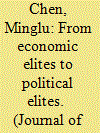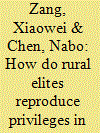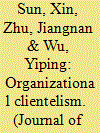| Srl | Item |
| 1 |
ID:
139260


|
|
|
|
|
| Summary/Abstract |
The number of entrepreneurs in the system of People's Political Consultative Conferences (PPCC) has increased dramatically in the last two decades. Although the political importance of these local assemblies is usually dismissed, entrepreneur participation suggests a need for further investigation. Based on research on a city-level PPCC, this article seeks to interpret this phenomenon further. In the process of investigating private entrepreneurs' involvement in the PPCC, this article aims to re-examine the role of the local PPCC and to highlight private entrepreneur PPCC members' attitude to and expectations from the Party-state.
|
|
|
|
|
|
|
|
|
|
|
|
|
|
|
|
| 2 |
ID:
139261


|
|
|
|
|
| Summary/Abstract |
Many scholars have shown that cadre status is associated with cadre earnings advantages in rural China. What is less clear from the published research is how political power is used by rural elites to generate personal gains. We narrow this knowledge gap by studying three main mechanisms whereby cadre privileges are reproduced in rural China. Using ethnographic data from three rural townships in Guangdong province, we show that local economies have been differentiated in the post-1978 era, leading to three different mechanisms with which village leaders in each of the three townships have maintained their earnings advantages respectively, i.e. local corporatism, informal bargaining and opportunistic parasitism. We predict that local corporatism will be the dominant model of the reproduction of cadre privileges in rural China.
|
|
|
|
|
|
|
|
|
|
|
|
|
|
|
|
| 3 |
ID:
128940


|
|
|
|
|
| Publication |
2014.
|
| Summary/Abstract |
Extant literature on authoritarian legislatures argues that dictators set up quasi-democratic institutions to co-opt opposition and attract investors. We argue that dictators also nurture clientelistic ties with social groups useful to their rule, a previously overlooked function of authoritarian legislatures. Drawing on the case of Chinese local legislatures-namely, the local People's Congress and the local People's Political Consultative Conference-we find that Chinese local governments use these institutions to channel patronage to and gain political support from the private sector. Field interviews and an analysis of a nationwide firm-level survey show that private firms owned by local legislative members, while obtaining more bank loans, provide more support to the local government in various forms than those owned by nonmembers. This finding suggests that authoritarian legislatures, even those with weak policymaking efficacy, can help authoritarian states build stable alliances with social groups, thereby contributing to regime resilience.
|
|
|
|
|
|
|
|
|
|
|
|
|
|
|
|